Episode 6
This episode features segments titled: A Little Bit of Learning, Off the Shelf, Yarn Lover at Large, and Ever-expanding Skill Set.
The word welt comes to us from Middle English; the first known use was during the 15th century. At first, the term was used to refer to a strip (of leather) sewn into other material as a technique for reinforcement. Or, a tape or cord sewn into a seam. Later, the definition expanded to refer to raised or swollen bumps on the skin or other surface. Stephen West’s Batad capelet includes bands of garter stitch with welts in stockinette stitch. The welts lend visual interest and texture to the garment, which is reminiscent of the rice terraces in the Ifugao region of the Phillipines. Though the welts in this pattern have been giving me fits, knitting them is teaching me how to read my knitting.
Off the Shelf
I’ve begun reading The Yarn Whisperer: My Unexpected Life in Knitting by Clara Parkes. In this memoir, Parkes makes extensive use of metaphor and builds connections between her life events and techniques in knitting. She is the creator and editor of The Knitter’s Review, a free, weekly, online magazine that reviews everything from knitting needles to retreats. Parkes’ writing is genuine and often beautiful. She knows and knows how to draw the reader in to her very personal story.
On Saturday, Samuel and I took an afternoon drive to Emmaus, PA, where we visited Conversational Threads, a yarn shop with great selection and a friendly staff. Sue coached me as I selected a yarn for the Hitchhiker shawl and Cindy wound all of my purchases while we had a nice Thai lunch down the street. I was pleased to meet some folks from the shop, as I will be joining them for the bus tour to Rhinebeck in October. This will be my first time visiting the New York Sheep & Wool Festival, so podcast listeners will be hearing more about it in coming episodes.
Ever-expanding Skill Set
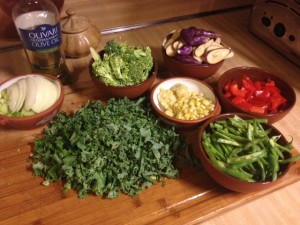 Sweet & Spicy Skillet Stir Fry
Sweet & Spicy Skillet Stir Fry
Combine equal parts brown sugar, balsamic vinegar (or soy sauce), and chili sauce or chili paste. Marinate pork chops or any other protein for at least 6 hours.
Prepare a variety of seasonal vegetables for sautéing. Some excellent choices are sliced onions, corn kernels, bell peppers, broccoli, French cut string beans, and baby eggplant.
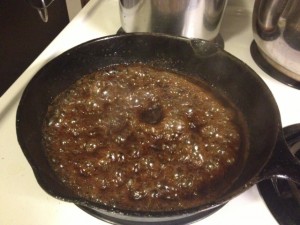 Chop a big bunch of kale and place in a large bowl. Sauté the vegetables in a cast iron skillet or wok, using a small amount of olive oil or other fat, and a sprinkle of salt. Work in small batches, being careful not to overcrowd the pan. Empty sautéed vegetables into the bowl, on top of the kale. Keep the bowl covered so that the kale wilts and vegetables stay warm.
Chop a big bunch of kale and place in a large bowl. Sauté the vegetables in a cast iron skillet or wok, using a small amount of olive oil or other fat, and a sprinkle of salt. Work in small batches, being careful not to overcrowd the pan. Empty sautéed vegetables into the bowl, on top of the kale. Keep the bowl covered so that the kale wilts and vegetables stay warm.
Sear the pork chops on each side and cook through. Remove to a plate. Pour marinade into the pan and bring to a simmer. Allow the sauce to thicken slightly, then pour (when very hot) over the sautéed vegetables and kale. Toss to coat vegetables with a sweet and spicy sauce.
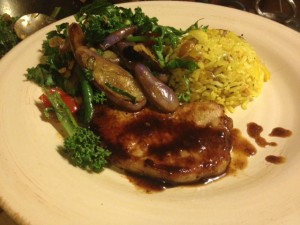 Serve pork and vegetables with a drizzle of remaining sauce and a side of rice pilaf.
Serve pork and vegetables with a drizzle of remaining sauce and a side of rice pilaf.
For more information on improvisational cooking, check out The Improvisational Cook by Sally Schneider.
After harvesting five bunches of goldenrod from a nearby field, I snipped off all the blossoms into a bowl. After starting a hot fire in our Big Green Egg charcoal grill, I submerged the blossoms in one gallon of filtered water. The mixture came to a boil – which took awhile – then simmered for about an hour. I let the liquid cool completely before straining, which is supposed to help the dye intensify in color. More on this next week, after I do a bit more research on mordants.
“Silence makes the real conversations between friends. It’s not the saying, but the never needing to say that counts.” — Margaret Lee Runbeck
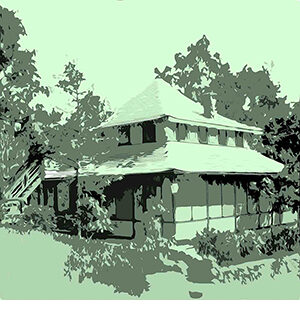
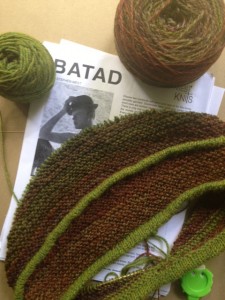
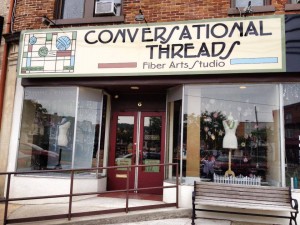
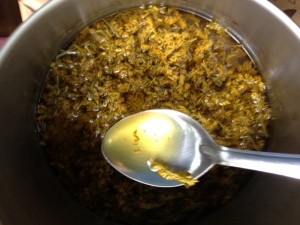
Sara,
Thank you for the “new listener” mention and appreciation of my listenership.
I, too, use cast iron skillets for cooking, and my most personal joy of cooking is how I tailor recipes to the specific likes and preferences of my family. Your balsamic marinade and vegetables-and-pork dinner sounds (and looks) fabulous! I am eager to try it and have everything but kale in my kitchen right now!
I enjoy watching your fiber-dying process unfold.
Laura
Sara,
Your little episodes of wisdom and joy through fiber are one of my week’s high points. I can picture the golden color of your goldenrod water and now I want to gather some to try dying merino this way. You make the simple things even lovelier.
ps Can’t wait to see Samuel’s hat!